In the beginning, monday.com started as a work management platform. Now, offers specialized products for sales, service, and development teams. That growth has led to a common question: how do you know whether to choose monday work management or monday CRM?
In this guide, we’ll break down the key differences between the two products, highlight where they overlap, and show how they can work together. Whether you’re managing internal projects or driving customer relationships, understanding monday CRM vs work management will help you pick the right tool — or confidently use both.
Try monday CRMWhat is a work management tool?
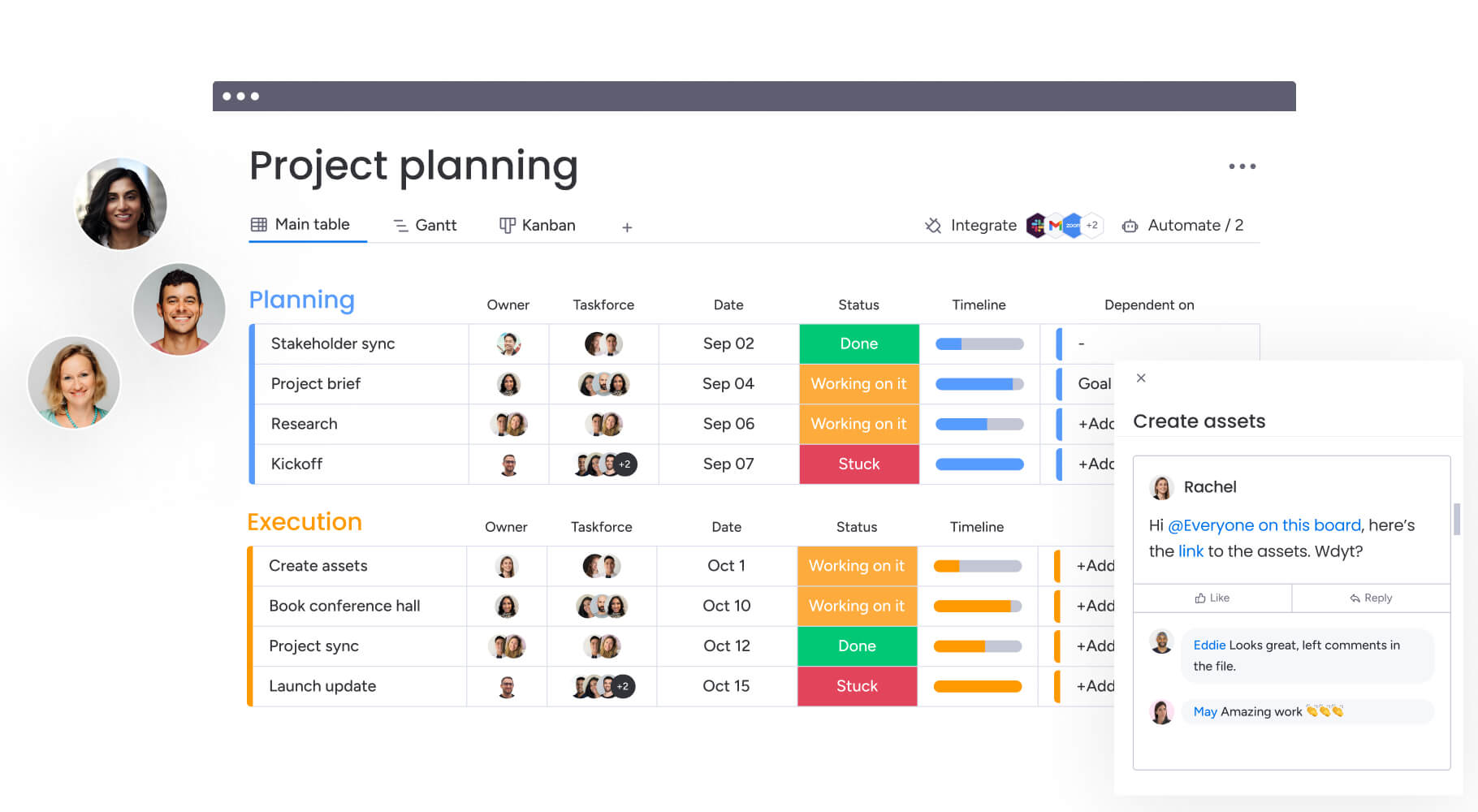
A work management tool is a digital platform that pulls all aspects of a workflow together in one place, including project planning, task organization, resource tracking, goal setting, and more. These platforms allow teams to work collaboratively in real time so that all workflows are consolidated and data is easily trackable.
Work management tools make it simpler for teams to assign task responsibilities and track project progress so that entire teams are working together towards larger organizational goals.
What is a sales CRM tool?
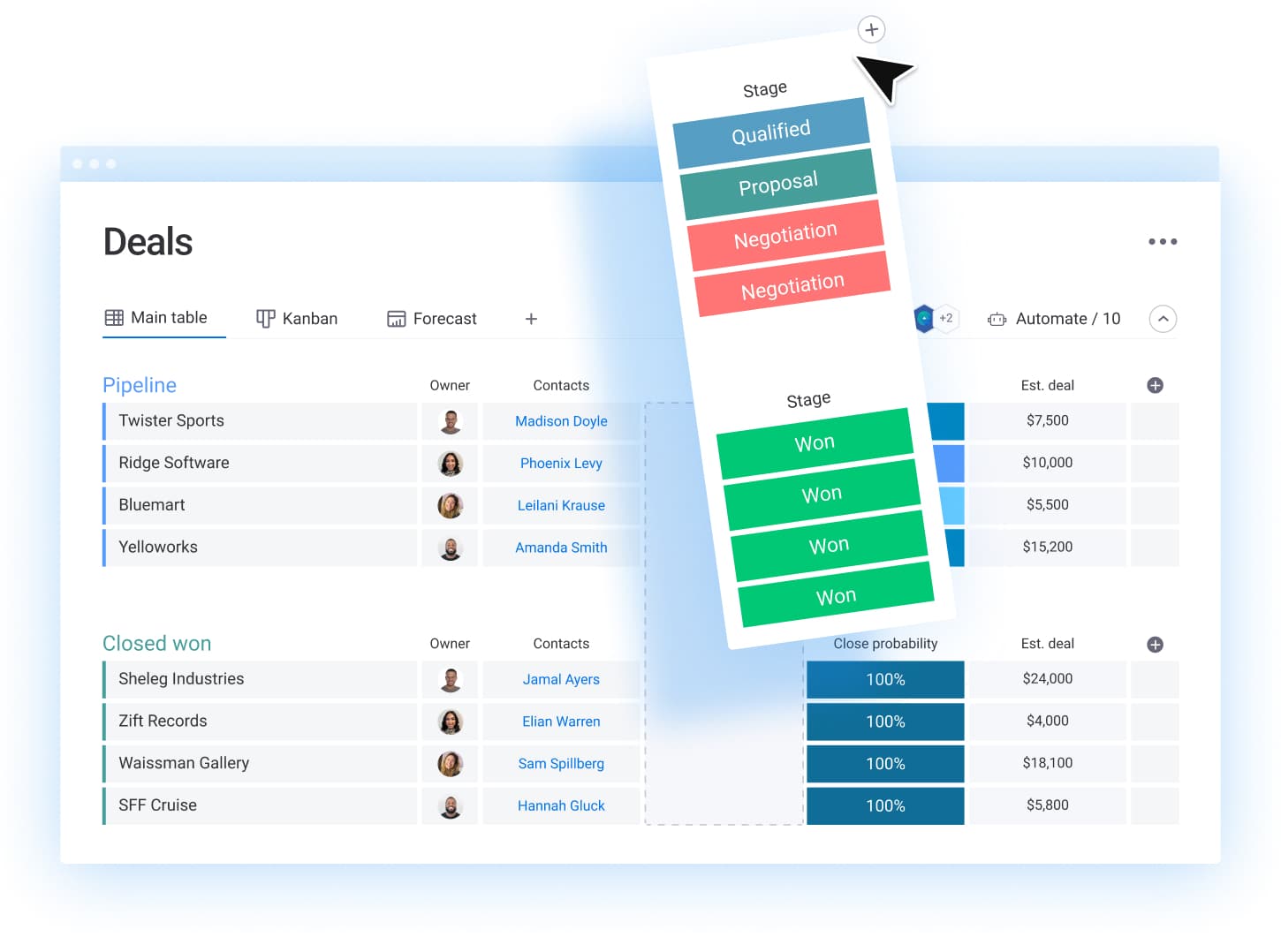
A customer relationship management tool, also known as a CRM, is a sales platform that teams use to manage communications and interactions with customers and prospects. CRM software helps teams keep all critical information about clients and prospects organized in one place, so that it’s easy to access data, purchase history, and multi-channel communications.
CRMs help organizations better understand customer journeys and preferences, making them ideal for not only sales agents but also marketing and customer service teams.
What’s the difference between monday work management and monday CRM?
Both monday CRM and monday work management are built on the monday.com Work OS and, although they share similarities, they aren’t the same product.
There is visual similarity with boards, automations, and dashboards, but monday CRM and monday work management serve different needs. But before we dive into their differences, let’s look at some core similarities.
Both monday CRM and monday work management:
- Help teams work collaboratively towards their goals
- Use AI to empower teams to work smarter while boosting efficiency and productivity
- Offer advanced workflow automations that reduce manual operations
- Scale to meet the needs of individual teams, small businesses, enterprises, and everything in between
Now, let’s dive deeper into what makes both platforms unique. In the table below, we’ll look at both platforms side-by-side to see how they compare.
| monday work management | monday CRM | |
|---|---|---|
| Primary purpose | Project management, team collaboration, and workflow automation across business operations | Customer relationship management, sales pipeline management, and revenue optimization |
| Core focus | Internal team productivity and project execution | External customer interactions and sales workflows |
| Target teams | Project managers, marketing, HR departments, operations teams, product teams | Sales teams, business development, account managers, customer success teams, marketing teams |
| Key features | Customizable project boards Gantt charts and timeline views Task management and dependencies Team workload management Time tracking Resource planning | Lead and contact management Pipeline visualization Sales forecasting Email sequence integration Sales automation workflows Quote and proposal management Revenue analytics and reporting |
| Workflow types | Campaign launches Product development cycles Event planning Content creation HR onboarding Marketing campaigns | Lead qualification Sales opportunity progression Customer onboarding Account management Follow-up sequences Renewal processes |
| Reporting & analytics | Project performance, team productivity, resource utilization, budgeting, milestone tracking | Sales agent performance, conversion rates, revenue forecasting, churn rates |
| Core customizations | Flexible boards for any workflow, custom fields for project data, status labels for project phases | CRM-specific customization for sales processes, deal stages, lead scoring and routing, sales territory management |
| Example use cases | Managing a website design project Coordinating a product launch Tracking marketing campaign deliverables Managing employee onboarding Event planning Managing a content calendar | Managing a B2B sales pipeline Tracking leads from different channels Nurturing prospects through sales cycle Managing key account relationships Forecasting quarterly revenue |
| Automation examples | Auto-assign tasks based on project type Send notifications when deadlines approach Move items between status columns Generate recurring tasks | Automate follow-up tasks after meetings Send email sequences to new leads Update deal stages based on activities Notify team of high-value opportunities |
| Success metrics to track | On-time project delivery, budget adherence, team performance, task completion rates | Revenue growth, conversion rates, sales cycle length, deal win rates |
What features are unique to monday sales CRM?
What’s most important to understand is that monday CRM is a product built on top of monday.com’s core platform: monday work management. What this means in practice is that monday CRM users can still access monday work management features but get additional features that make the platform a standalone CRM system.
Aside from the features we mentioned in the previous table, monday CRM has some of its own unique features that monday work management users don’t have access to, including:
- Item creation forms
- CRM data enrichment
- Duplicate entry management
- Widgets for deal stages, funnel charts, leaderboard, and sales gauge
- Sales pipeline view
- Advanced CRM reporting
- Shared email inbox and templates
- Email campaigns, mass emails, and tracking
- Quotes and invoices
These additional features, among others, are meant to boost revenue-focused operations in sales and marketing teams. Of course, that doesn’t mean that both monday CRM and monday work management can’t work symbiotically.
Note: You can gain access to virtual events on monday CRM through the monday mansion integration (available on Pro and Enterprise plans). This feature lets teams host webinars, demos, and networking sessions, with attendee tracking and lead data automatically synced into the CRM.
How can monday work management and monday CRM work together?
In some cases, certain teams may benefit from focusing on one product over the other, but it’s also common for teams to use both together to really make the most of all available features and streamline company-wide operations.
While they both function as completely standalone products, think of the two as siblings in the monday.com family and work together seamlessly. Sales-centered teams will probably get more out of monday CRM, while other departments can use monday work management to take care of other important business workflows. Using both systems at the same time also makes cross-collaboration between teams a lot smoother.
Users can switch between the two products in one click, and team members and departments can still tag each other and communicate with full visibility, no matter what product they’re using.
For example, when a sales team closes a deal in monday CRM, they can automatically trigger a client onboarding project in monday work management. Then, the appropriate team can take over onboarding and have access to the customer’s interaction history with the sales teams so they can pick up exactly where they left off.
Which product should you choose: monday work management vs monday CRM
Not sure which product to choose? We’re here to help.
Go with monday work management if you …
- Want a flexible project management platform
- Want to improve internal productivity through seamless collaboration
- Want to manage projects and automate project workflows across different departments
Go with monday CRM if you …
- Are a sales team focused on revenue generation
- Want to focus on managing customer relationships
- Want to optimize sales processes and track deals in your pipeline
Still unsure? We recommend starting with monday work management, which acts as the base upon which other monday.com products like monday CRM are built. You can still configure monday work management to function as a CRM if you need to, though you won’t get access to the unique monday CRM features we mentioned earlier.
Then, if you see you’re relying heavily on monday work management as a CRM system, you can add monday CRM as an additional product to your system so that you can enjoy the best of both worlds.
New features and AI capabilities in monday CRM
In addition to the list of features we’ve looked at in monday CRM, the platform also comes equipped with some advanced, newer features that are worth examining. Thanks to the integration of artificial intelligence, monday CRM helps teams work more productively with access to robust tools that can lead to better lead conversions and more sales.
Because monday CRM is built on the monday.com Work OS, users who want to make the most of these advanced AI features may consider using monday CRM over monday work management. The platform gives users the best of both worlds, but thanks to the additional unique features along with CRM automations and strong AI capabilities, the platform could be a little more flexible for a variety of teams.
Revenue-driven teams can still use monday CRM to manage tasks and projects while benefitting from AI technology to improve sales workflows.
Let’s take a closer look at some of monday CRM’s new features and AI capabilities that make it shine for both CRM and work management use cases.
Predictive analytics and AI forecasting
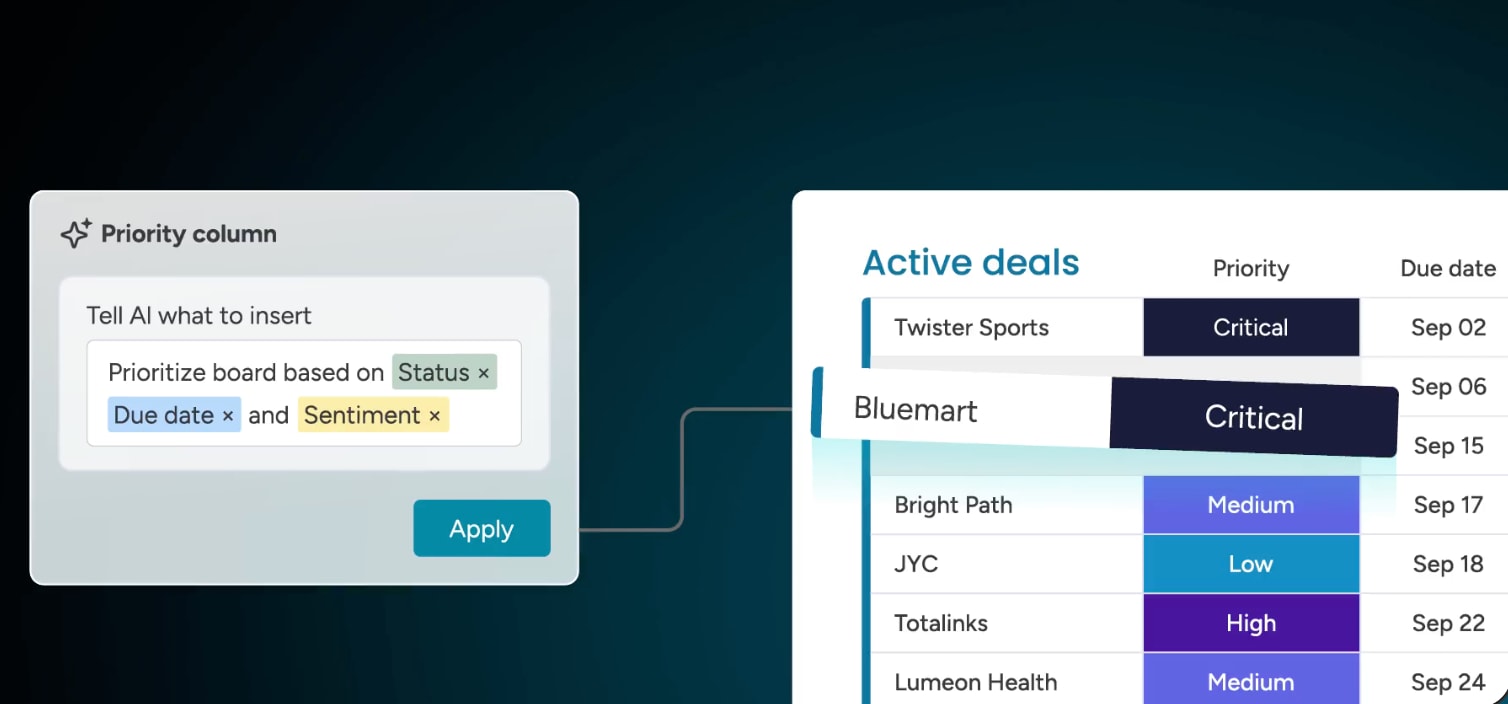
Sales teams can benefit from predictive analytics and AI-powered sales forecasting to gauge what’s going on in the pipeline. These features allow teams to assess which deals are likely to close so that effort can be focused on the right prospects. In work management, AI resource forecasting can also come in handy when it comes to keeping projects on time and within budget.
AI assistance with monday sidekick
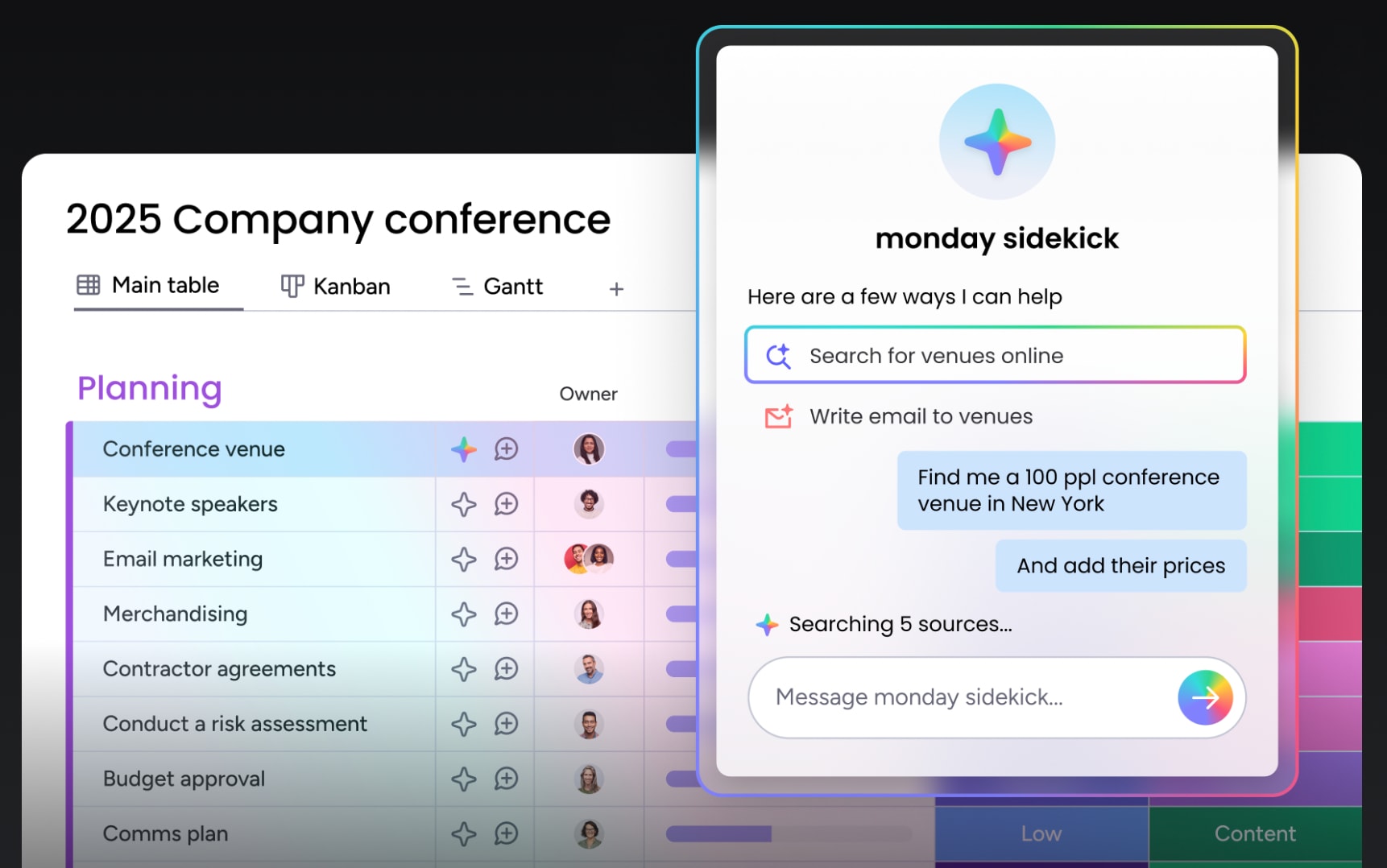
With a built-in AI assistant, monday sidekick, any team member can use natural language to complete tasks, get suggested next steps, and gather data. With monday sidekick, both sales and operational teams can use the AI assistant for a variety of tasks like strategizing sales pitches, composing emails to prospects or vendors, or searching the web for data like lead enrichment or conference venues.
Generative AI for custom content
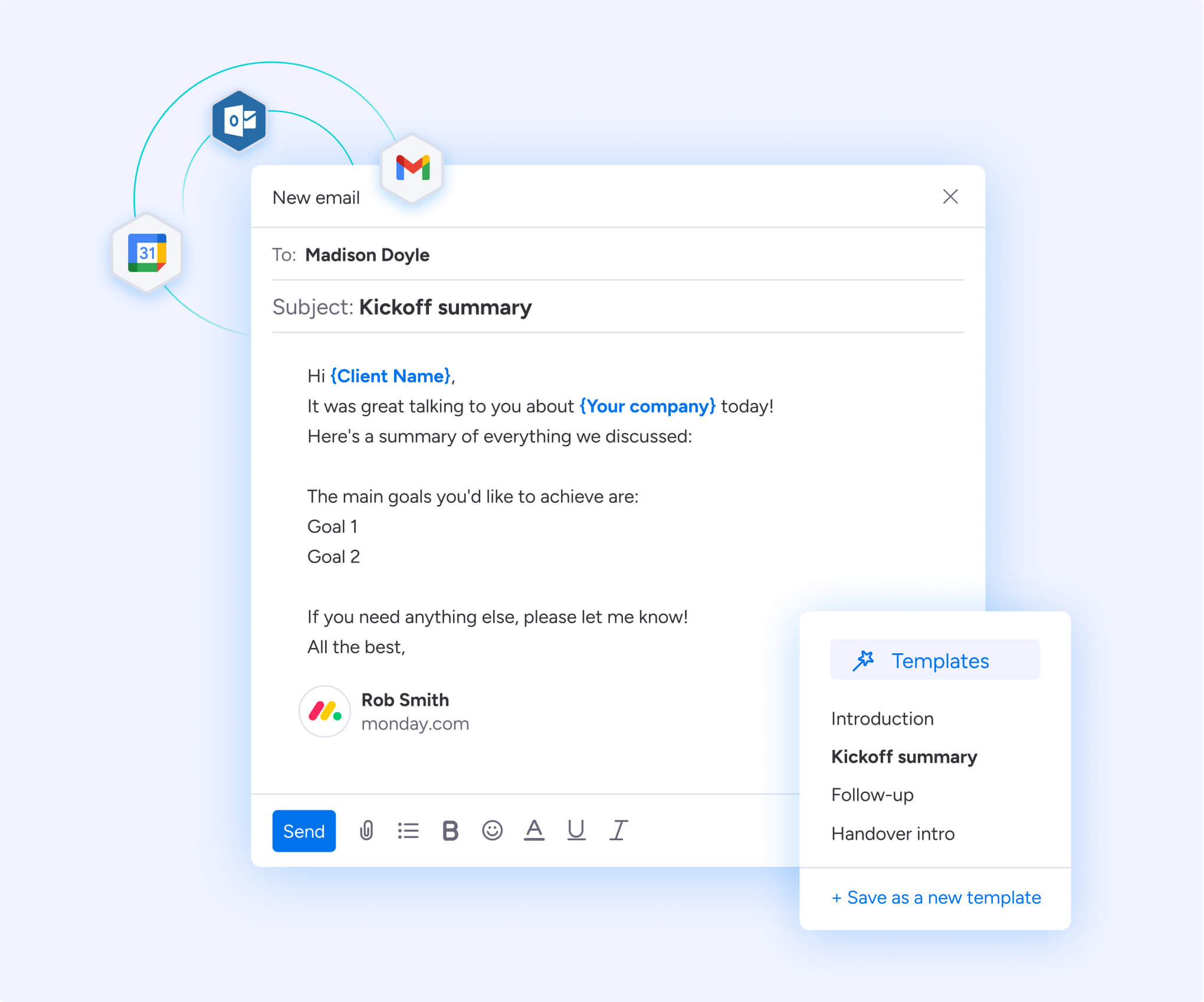
AI writing assistants make it easier for teams to create custom content on the spot. Sales teams can compose personalized emails in minutes, marketing teams can use CRM data to build smart marketing campaigns, product teams can generate project briefs and documentation, and HR teams can use it to draft job descriptions and training materials.
Smart prioritization with AI

With monday CRM, AI-powered prioritization pulls data such as sentiment analysis and engagement levels to prioritize incoming leads. The same feature can also be used to organize tasks according to status, due date, and priority level so that project and sales teams can collaborate in real-time on the deals and tasks that have the largest impact.
Try monday CRMUnderstanding monday CRM plans and pricing
Pricing can be confusing, especially if you’re new to software pricing structures. While monday.com’s products might look similar at first glance, we’ve already established how they differ, and pricing is no exception. Users will notice that monday work management and monday CRM are priced differently, with monday CRM clocking in a little higher than work management plans. There’s a reason for this, though, namely the additional features monday CRM users get compared to work management plans.
Below, we’ll break down what you get with each monday CRM plan to help clear up any pricing confusion. The prices in the table are monthly rates based on a yearly plan, but it’s worth noting that monthly plans come in a few dollars more per seat.
| Basic | Standard | Pro | Enterprise | |
|---|---|---|---|---|
| Price per seat | $12 | $17 | $28 | Custom |
| Contacts | Unlimited | Unlimited | Unlimited | Unlimited |
| Boards | Unlimited | Unlimited | Unlimited | Unlimited |
| File storage | 5 GB | 20 GB | 100 GB | Unlimited |
| Custom automations | N/A | 250 actions/month | 25,000 actions/month | Custom |
| Custom integrations | N/A | 250 actions/month | 25,000 actions/month | Custom |
| Features | Customizable pipelines Templates for lead, contact, & deal management | Everything in Basic plus: Email integration with Gmail and Outlook Activity management Merge duplicate data | Everything in Standard plus: Email templates Quotes & invoices Mass email Google Calendar Sync Sales analytics Time tracking | Everything in Pro plus: Team goals Advanced analytics Account management Enterprise-grade security and permissions |
| AI features | N/A | Trial AI credits AI email generator | Everything in Standard plus: Sales forecasting Sales analytics Sequences | Everything in Pro plus: Lead scoring |
| App integrations | N/A | PandaDoc Docusign Aircall | Everything in Standard plus: MailChimp HubSpot Facebook Ads Salesforce | Same as Pro |
| Views and reporting | Kanban | Everything in Basic plus: Timeline Calendar Map | Everything in Standard plus: Chart Workload | Same as Pro |
| Security and compliance | SOC 2 Type II Two-factor authentication | Same as Basic | Everything in Standard plus: Private boards and docs Google authentication | Everything in Pro plus: HIPAA compliance Integration permissions IP restrictions |
To get a more comprehensive view of all monday CRM plans and prices, have a look at our pricing page to find the best plan for your needs.
The bottom line on choosing the right software
Overall, you can’t go wrong with either monday work management or monday CRM. Both platforms will help your team reach its goals, whether it’s launching a product or closing more deals. That said, teams who want to do it all without bouncing between different programs can benefit from monday CRM as both an all-in-one sales platform and project management solution.
If you want a little bit of everything in one solution and advanced AI capabilities to work more effectively, monday CRM is a reliable choice that will scale as your team grows.
Try monday CRMFAQs
What are the main benefits of using monday CRM?
Teams that use monday CRM can benefit from quicker deal closures thanks to streamlined pipeline management and automated follow-ups that prevent leads from falling through the cracks. The platform also increases sales productivity by eliminating manual tasks, while AI-powered insights help teams focus efforts on high-converting prospects, leading to an increase in revenue and improved forecasting accuracy.
Can you use monday work management for sales and CRM tasks?
While the platform can track sales projects and manage client relationships through customizable boards, it lacks specialized CRM features like lead scoring, pipeline forecasting, and sales automation. For basic sales task management, it works, but dedicated CRM functionality requires monday CRM.
How does the pricing for monday CRM differ from monday work management?
Both platforms use per-seat, tiered pricing. monday CRM costs slightly more because it includes sales-focused features at each tier. The work management platform offers broader functionality that can fit different departments, while CRM pricing reflects specialized sales tools and capabilities.
Is monday CRM a good CRM for small businesses?
Yes, monday CRM is great for small businesses due to its user-friendly interface, scalable pricing tiers, and comprehensive sales features that aren’t technically challenging. The system grows alongside your business, offering affordable pricing points and enterprise-level AI capabilities that help small sales teams compete.
 Get started
Get started 

